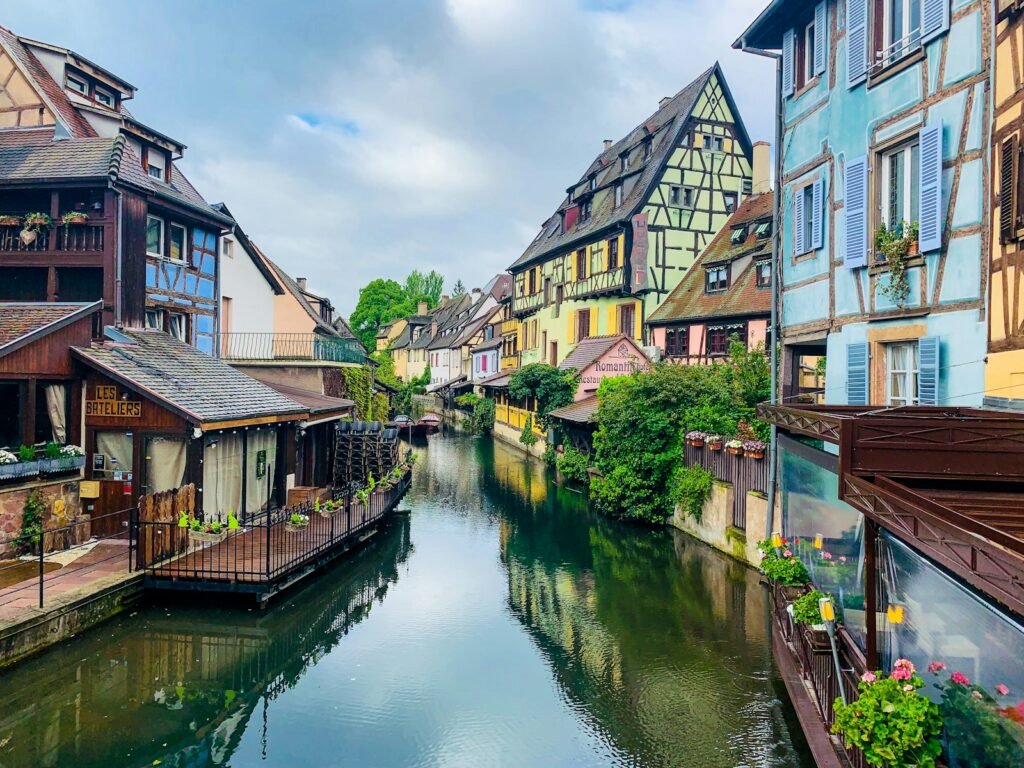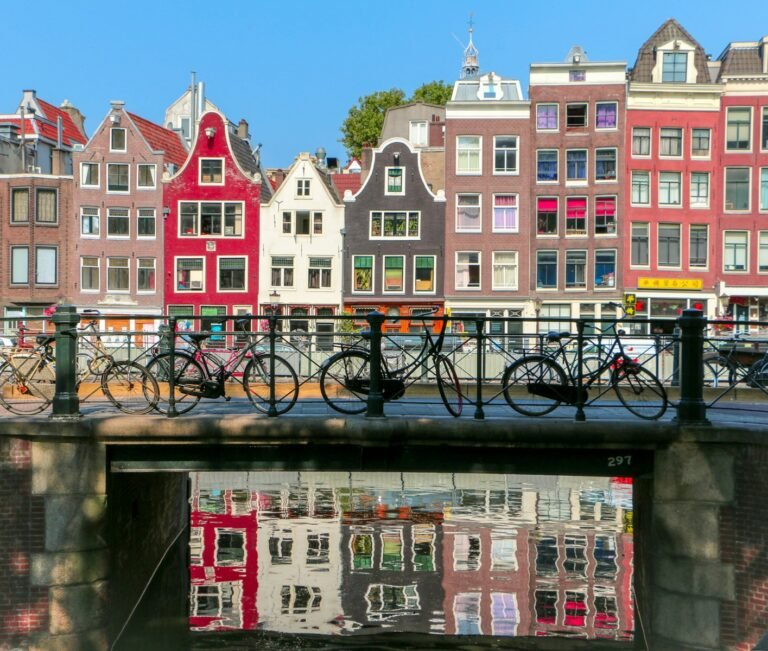Everything You Need to Know About France’s Digital Nomad Visa in 2025
So, you’re dreaming of packing up your laptop and working remotely from one of Europe’s most beautiful destinations—France? Well, you might be in luck! France’s Digital Nomad Visa, which is just starting to gain more popularity, might be your ticket to a whole new way of living. Imagine sipping coffee in a Parisian café or strolling along the French Riviera, all while keeping your work life rolling! It’s a reality for many who have the freedom to work remotely, and this visa makes it a bit easier than ever before.
In this article, I’m going to break down everything you need to know about France’s Digital Nomad Visa. This includes who’s eligible, the application process, and even some cool tips about how to make the most of living and working in France. Whether you’re a freelancer, an entrepreneur, or working remotely for a foreign company, this could be your perfect setup!
What is the France Digital Nomad Visa?
The France Digital Nomad Visa is a special type of temporary residence permit designed for remote workers. It allows individuals to live in France while working either for a foreign company or as a freelancer. This visa is an excellent opportunity for digital professionals to experience life in France without needing to secure a job with a local employer.
France introduced the Digital Nomad Visa as part of its broader initiative to attract global talent and boost its economy while embracing the remote work revolution. The visa caters to those seeking greater flexibility in how and where they work, making it a perfect fit for the growing digital nomad community.
Key Benefits of the Digital Nomad Visa
Here’s what this visa enables you to do:
- Work Remotely While Residing in France
You can live in France for up to one year under this visa and, in many cases, apply for a renewal. Whether you’re working for a company based abroad or managing your own freelance business, the visa provides the legal framework to work while enjoying the French lifestyle. - Explore the Schengen Area
With this visa, you’re not just limited to France. You can also travel to any Schengen area country for up to 90 days within a 180-day period. This freedom to explore Europe is a significant advantage for adventurous remote workers. - Enjoy French Living at Its Finest
From the vibrant streets of Paris to the serene beaches of the French Riviera, you’ll experience all the perks of living in one of Europe’s most desirable destinations. You get to immerse yourself in French culture, cuisine, and history—all while legally working and maintaining your income.
Unlike traditional work permits, the Digital Nomad Visa eliminates the requirement for a local employer in France, making it a game-changer for those in the global remote work scene. It’s the ideal visa for digital professionals looking to combine work with the charm of French living.
Whether you’re a tech wizard, content creator, or entrepreneur, the France Digital Nomad Visa opens the door to a unique experience blending productivity and adventure.

Who Can Apply for the Digital Nomad Visa in France?
The France Digital Nomad Visa is designed for a variety of remote workers, whether you’re a freelancer, entrepreneur, or employee of a foreign company. The application requirements are flexible enough to accommodate many types of professionals, but there are certain criteria you’ll need to meet. Here’s a detailed breakdown of who qualifies:
Freelancers & Entrepreneurs
If you’re self-employed and work remotely for clients based outside of France, you’re eligible to apply for this visa. This includes:
- Freelancers offering services in fields like graphic design, writing, coding, or consulting.
- Entrepreneurs managing their own businesses or startups remotely.
You’ll need to show evidence of ongoing contracts with international clients or proof of your business operations.
Remote Employees
Do you work for a company located outside of France? If your employer allows remote work and your position meets the income requirements, you may also apply. This applies whether you’re a software developer, customer service representative, or any other type of professional working for a foreign employer.
Income Requirements
One of the key aspects of the application is proving you have sufficient financial resources to support yourself during your stay in France. This is typically done by showing:
- Pay slips or invoices from your employer or clients.
- Bank statements proving consistent income or savings.
The exact income threshold varies depending on the region of France you’ll be living in, but a common benchmark is matching or exceeding the French minimum wage, which is around €1,329 net per month as of 2024. Keep in mind that higher income may be required for urban areas with a higher cost of living, like Paris.
Documentation Requirements
To support your application, you’ll need to provide key documents that prove your eligibility:
- Proof of Employment or Business Operations: A letter from your employer, signed client contracts, or registration documents for your business.
- Income Verification: Recent pay slips, bank statements, or invoices that confirm your ability to sustain yourself financially.
- Health Insurance: Comprehensive health insurance that covers you during your stay in France, including repatriation costs if needed.
- Residence Details: Proof of a place to stay in France, whether it’s a rental agreement, hotel reservation, or a letter from a host.
Additional Criteria
While requirements may vary slightly based on individual applications or consulates, these are common to most applicants:
- Criminal Background Check: You may be asked to provide a clean criminal record from your home country or countries where you have resided.
- Commitment to Remote Work: It’s crucial that your professional activities remain tied to foreign clients or employers; you cannot work for a French company under this visa.
Why These Criteria Matter
France’s Digital Nomad Visa was created to attract skilled professionals while ensuring they contribute positively to the economy and cultural ecosystem. Meeting these criteria demonstrates that you’re self-sufficient, and your work doesn’t take employment opportunities from the local labor market.
Whether you’re a freelancer building your brand, an entrepreneur scaling your business, or a remote employee enjoying flexibility, this visa offers a chance to live and work legally in one of the most culturally rich countries in Europe.

How to Apply for the France Digital Nomad Visa
Applying for the France Digital Nomad Visa may seem daunting at first, but the process is fairly straightforward if you know what to expect. Here’s a detailed guide to help you navigate every step of the application process, from preparation to approval.
1. Gather Your Documents
The first step is assembling all the necessary documents. These provide proof of your eligibility and demonstrate that you can support yourself financially during your stay in France. The required documents typically include:
- Proof of Employment or Self-Employment:
- A signed employment contract from your current employer stating you work remotely.
- If you’re self-employed or a freelancer, client contracts or a portfolio demonstrating active projects with international clients are crucial.
- Proof of Financial Means:
- Recent bank statements showing regular income or sufficient savings to meet the French income threshold (typically at least €1,329 net per month, but this can vary).
- Health Insurance Coverage:
- Documentation proving you have comprehensive health insurance that covers medical expenses and repatriation for the duration of your stay.
- Valid Passport:
- Your passport should be valid for at least six months beyond your planned stay in France.
- Proof of Accommodation:
- Evidence of where you’ll stay in France, such as a rental agreement, hotel reservation, or an invitation letter from a host.
- Additional Documents (Optional but Recommended):
- A cover letter outlining your plans in France, your professional activities, and how you meet the visa’s requirements.
- A clean criminal background check from your home country or most recent place of residence (some consulates require this).
2. Submit Your Application
Once you’ve compiled your documents, you’ll need to submit your application at the nearest French consulate or embassy in your home country. Follow these steps:
- Make an Appointment:
- Visit the consulate’s website to schedule an appointment. Slots can fill up quickly, so plan ahead.
- Complete the Visa Application Form:
- Fill out the long-term visa (visa de long séjour) application form. Most consulate websites will provide the form as a downloadable PDF.
- Submit Your Documents:
- During your appointment, present all the required documents. Make sure to bring both the originals and copies for verification.
- Pay the Visa Fee:
- The application fee is generally around €99 but may vary based on your country of residence.
3. Wait for Approval
The visa processing time can range from a few weeks to up to three months, depending on the consulate and your specific application. During this time, officials will verify your documents and assess your eligibility.
- Pro Tip: Apply as early as possible, especially if your travel plans are time-sensitive. This ensures you have enough time to address any unforeseen delays.
4. Receive Your Approval and Travel to France
Once your visa is approved, you’ll receive a notification to pick up your passport, which will now contain the long-term visa. This visa serves as your initial entry permit into France.
5. Obtain Your Residence Permit in France
When you arrive in France, your visa allows you to stay for an initial period, but you’ll need to complete one final step: obtaining your residence permit (titre de séjour). Here’s how to finalize your paperwork:
- Register with French Authorities:
- Within the first three months of arriving, you must register with the local French immigration office (OFII) or prefecture.
- Complete Biometric Data Appointment:
- You may be asked to provide fingerprints and other personal information as part of the process.
- Receive Your Residence Permit:
- Once all requirements are met, you’ll receive a residence permit allowing you to live and work remotely in France for up to 12 months.
6. Renewal Options
At the end of your initial 12-month stay, you may apply to renew your residence permit if you wish to extend your stay. Ensure you meet the financial and legal requirements for renewal, and start the renewal process early to avoid any gaps.
Key Tips for a Smooth Application Process
- Double-Check Your Paperwork: Incomplete or incorrect documentation can delay your application.
- Stay in Contact with the Consulate: Keep an open line of communication for updates and any additional requirements.
- Be Prepared for an Interview: Some consulates may request an interview to discuss your plans and ensure your application meets the criteria.
By following this step-by-step guide, you can confidently navigate the process of applying for the France Digital Nomad Visa, giving yourself the opportunity to enjoy the beauty and lifestyle of one of Europe’s most iconic destinations—all while legally working remotely!

The Benefits of Living and Working in France as a Digital Nomad
Moving to France as a digital nomad offers a perfect blend of professional opportunities and an enviable lifestyle. Beyond being one of the world’s most iconic destinations, living in France comes with perks that enrich both work and personal life. Here’s why so many digital nomads dream of calling France their temporary home:
1. Lifestyle Perks
Living in France is like stepping into a postcard. Whether you’re strolling through the romantic streets of Paris, soaking up the sun on the French Riviera, or hiking through the lush countryside, the quality of life in France is hard to beat.
- Art and History Everywhere: France’s museums, galleries, and historical landmarks offer endless inspiration and are a feast for the senses. Imagine taking a break from work to visit the Louvre or exploring ancient castles during your weekends.
- World-Class Cuisine: The French know how to eat, and as a resident, you’ll have access to regional delights like buttery croissants, fresh oysters, creamy cheeses, and locally crafted wines. Working remotely never tasted this good!
- Vibrant Urban Centers: Cities like Paris, Lyon, and Marseille combine modern infrastructure with old-world charm, offering coworking spaces, networking opportunities, and excellent public transport.
2. Access to the Schengen Area
One of the biggest advantages of the France Digital Nomad Visa is access to the Schengen Zone. As a visa holder, you can travel freely to 26 European countries for up to 90 days within any 180-day period.
- Endless Travel Opportunities: Fancy a weekend ski trip in Switzerland? Or how about a jaunt to the sunny beaches of Spain? Living in France puts all of Europe within easy reach.
- Cultural Diversity at Your Fingertips: Each Schengen country offers its own unique culture, traditions, and experiences, adding variety to your nomadic lifestyle.
- Seamless Borders: Forget lengthy customs checks—Schengen travel is effortless, allowing you to focus on experiencing new destinations.
3. Cultural Immersion
Living in France means more than just being physically present—it’s an invitation to immerse yourself fully in a rich and diverse culture.
- Mastering the Language: Working remotely allows you the time and flexibility to learn French, which not only opens doors locally but also makes daily interactions more enriching. Whether it’s ordering at a café or chatting with neighbors, each encounter deepens your connection to the culture.
- Adopting a Slower Pace: French culture values work-life balance. Long lunches, leisurely dinners, and relaxed Sundays encourage you to enjoy life outside of work. Embracing this rhythm can add balance and joy to your daily routine.
- Building Local Connections: Whether you join a book club, take up wine tasting, or attend community events, France offers plenty of opportunities to meet locals and build a network of friends who share your interests.
- Enhancing Your Work with French Flair: From inspired architecture to elegant fashion, France has a way of influencing your aesthetic and work style. Don’t be surprised if some of that French sophistication seeps into your presentations or projects!
4. Professional Growth Opportunities
France’s cities are hubs for innovation, entrepreneurship, and networking, making it an excellent location to advance your career while enjoying the digital nomad lifestyle.
- World-Class Infrastructure: France offers robust digital connectivity, making it easy to work from coworking spaces, cafés, or even remote villages without losing your link to the online world.
- Access to Diverse Talent Pools: As a part of a broader European network, you’ll have access to industry professionals, collaborators, and potential clients from around the continent.
- Creative Inspiration: France has inspired countless innovators, artists, and entrepreneurs throughout history. It’s a place where ideas flourish, whether you’re building a brand, launching a product, or creating something new.
5. Quality of Life and Well-Being
France is consistently ranked as one of the best places in the world to live for its combination of healthcare, infrastructure, and cultural offerings.
- World-Leading Healthcare: With a residency permit, you can access France’s high-quality healthcare system, offering peace of mind during your stay.
- Safety and Security: France is known for its high standard of living and well-maintained public spaces, making it a great place for both individuals and families.
- Time to Explore Your Passions: The French lifestyle encourages leisure, making it the perfect place to pick up a new hobby, whether it’s photography, painting, or cycling through scenic wine regions.
Living and working in France as a digital nomad isn’t just about geography—it’s about adopting a lifestyle that combines cultural richness, professional opportunities, and everyday enjoyment. With the flexibility of remote work and the adventure of European living, France offers an experience that’s as inspiring as it is fulfilling.

Common Questions About the France Digital Nomad Visa
If you’re considering applying for the France Digital Nomad Visa, you’re probably curious about some of the finer details. Here are answers to the most frequently asked questions to help you make informed decisions about your move to France.
1. Can I Bring My Family with Me?
Yes! France allows you to share this incredible experience with your loved ones by applying for a family visa.
- Who Can Join? Your immediate family members, such as your partner (spouse or legal partner) and children, can be included in your application process.
- How Does It Work? The family visa is usually tied to the primary applicant’s visa. This means you’ll need to demonstrate that you can financially support your family during your stay and that you have adequate health insurance for everyone.
By bringing your family along, you get to enjoy everything France has to offer together, from strolling Parisian streets to weekend trips in the countryside.
2. What If I’m Just Visiting as a Tourist?
The Digital Nomad Visa is specifically designed for those planning an extended stay while working remotely. If your intention is just to explore France on vacation, here’s how the scenarios differ:
- For Short Trips: If you’re visiting France for 90 days or less, a tourist visa (or no visa if you qualify under visa-free travel agreements) will suffice.
- For Work and Travel: If you’re staying for several months or longer while working remotely, the Digital Nomad Visa gives you the legal framework to live and work in the country without needing a traditional work permit.
Remember, using a tourist visa while working remotely may violate the terms of entry, so the Digital Nomad Visa ensures compliance with French regulations.
3. Can I Stay After My Visa Expires?
If you fall in love with France—as many people do—you might want to stay beyond your initial visa period. Luckily, France provides opportunities for visa extensions.
- Renewal Options: The Digital Nomad Visa is generally renewable as long as you continue to meet the eligibility criteria. For instance, you’ll need to prove ongoing income, valid health insurance, and a clean legal record in France.
- Timelines for Renewal: It’s a good idea to start the renewal process a few months before your visa expires. French bureaucracy can take time, so early planning ensures you can transition seamlessly into an extended stay.
- Switching Visas: If you decide to make France your long-term base, you may be eligible to apply for a different type of residence permit, depending on your circumstances.
Planning ahead is key—don’t wait until the last minute to secure your ability to stay legally!
4. Can I Freelance for Local Clients While on This Visa?
The main purpose of the Digital Nomad Visa is to allow you to work remotely for foreign clients or companies while living in France. That said:
- Foreign Clients: You are free to maintain your current remote work setup for clients or companies based outside France.
- Local Clients: Working for French companies or clients might require additional permissions, as it could technically fall under local labor laws. It’s best to consult a legal expert or the local consulate to clarify this aspect.
Keeping the focus on non-French clients ensures you remain compliant with the visa’s primary purpose.
5. Do I Need to Pay Taxes in France?
This depends on the length of your stay and your tax residency status.
- Short Stays: If your stay in France is less than 183 days in a year, you’ll typically maintain your tax residency in your home country.
- Longer Stays: Staying beyond 183 days generally makes you a tax resident in France, meaning you may be liable for French taxes on global income.
- Double Tax Treaties: France has agreements with many countries to avoid double taxation, which means you might not have to pay taxes twice on the same income. Consulting a tax advisor familiar with French and international taxation can save you a lot of hassle.
Understanding your tax obligations is crucial, especially for digital nomads managing income from multiple sources.
6. Do I Need to Speak French to Apply or Live in France?
While speaking French isn’t a strict requirement to obtain the Digital Nomad Visa, knowing the language is highly advantageous:
- During Application: The visa process may involve filling out forms or communicating with officials in French. Many consulates or embassies can accommodate English speakers, but being able to navigate French forms and interviews can help.
- While Living in France: Basic French skills can make daily life much easier, from shopping at local markets to navigating public transport. Apps, language classes, or a language exchange partner are great ways to get started.
Plus, making an effort to learn French helps integrate into the local community and culture.
The France Digital Nomad Visa opens up a world of opportunities for remote workers looking to embrace life in a country synonymous with culture, history, and elegance. Whether you’re bringing your family, traveling through Europe, or planning to extend your stay, this visa can help make your dream of working abroad a reality

Tips for a Smooth Transition to Life in France
Moving to a new country, especially one as enchanting as France, is exciting—but it also comes with its own challenges. These tips will help ensure your transition to life in France is as seamless as possible, whether you’re settling in for a year or considering a longer stay.
1. Learn Some French
While fluency isn’t a requirement, picking up even a little bit of the local language can make a world of difference.
- The Basics Go a Long Way: Learn phrases like “Bonjour,” “Merci,” and “Où est le métro ?” (Where is the metro?) to help with daily interactions.
- French People Appreciate the Effort: Even if your accent is less than perfect, locals will respect your attempt to communicate in their language.
- Apps & Courses to Help: Use apps like Duolingo, Babbel, or Rosetta Stone to get started, or enroll in language classes once you’re in France.
- Pro Tip: Make an effort to listen to French music, watch French TV shows, or even join local meet-ups to immerse yourself in the language and culture.
A bit of language learning can also open doors to friendships and opportunities you might otherwise miss.
2. Prepare for the Cost of Living
France has a reputation for elegance, but that refinement can sometimes come with a high price tag—especially in certain regions.
- Paris and Major Cities Are Pricey: Rent in Paris can be high, and dining out regularly or shopping in popular tourist areas may quickly add up. Expect rent in Paris to start around €1,200 for a small apartment, depending on the neighborhood.
- Affordable Alternatives: Explore smaller cities like Toulouse, Lille, or Nantes, which offer a lower cost of living but still boast vibrant communities and amenities.
- Know the Essentials: Don’t forget to budget for:
- Health Insurance: A legal requirement for staying in France.
- Public Transport: Cities like Paris, Lyon, and Marseille have excellent public transport systems, but costs can add up over time.
- Groceries: Shopping at local markets is not only affordable but also a quintessential French experience.
- Pro Tip: Cook at home using fresh produce from weekly markets to save money and embrace the French culinary tradition.
Being financially prepared will ease the adjustment and allow you to enjoy life in France without unnecessary stress.
3. Explore Outside Paris
While Paris is often at the top of people’s bucket lists, France has much more to offer beyond its capital.
- Lyon: Known as the gastronomic capital of France, Lyon offers a vibrant food scene, stunning Roman ruins, and a more affordable lifestyle.
- Bordeaux: If you’re a wine lover, this southwestern city is paradise. Bordeaux combines historic charm with a lively cultural vibe.
- Strasbourg: Sitting on the border of France and Germany, Strasbourg’s unique blend of French and German cultures is reflected in its stunning architecture and delicious cuisine.
- Toulouse: Nicknamed “La Ville Rose” (The Pink City) for its terracotta bricks, Toulouse is a hub for aerospace and innovation with a relaxed lifestyle.
- The Countryside and Villages: For a more tranquil life, explore smaller towns or the French countryside. Areas like Provence or the Loire Valley offer postcard-perfect landscapes and slower-paced living.
- Coastal Charms: The French Riviera (Nice, Cannes, Marseille) offers sunshine and seaside living, albeit at higher costs. Brittany and Normandy provide rugged coastlines and quaint charm with more reasonable prices.
Living outside Paris doesn’t mean compromising on culture or excitement—it simply means experiencing another side of France.
4. Embrace French Culture and Customs
France is a country deeply rooted in tradition and etiquette, and adjusting to these norms will help you integrate more smoothly.
- Greetings Are Important: Always say Bonjour (hello) when entering a shop or speaking with someone—it’s considered rude not to!
- Understand Meal Times: Meals are often long and leisurely, especially in the evenings. Use this time to connect with friends, colleagues, or your local community.
- Market Days Are Sacred: Shopping at local markets is a way of life in France. Learn what days markets are held in your area to stock up on fresh produce and artisanal goods.
- Respect the Quiet Hours: Many towns and cities observe quiet hours in the evenings, so keep noise to a minimum.
- Build Relationships: French people value meaningful connections, so take your time forming friendships and don’t be discouraged if people seem reserved at first.
5. Navigate Bureaucracy with Patience
France is known for its complex bureaucracy, and you’ll inevitably encounter it during your stay.
- Stay Organized: Keep copies of all important documents, including your visa, health insurance papers, and proof of income.
- Learn to Wait: Be prepared for slow processes, whether it’s setting up a bank account or registering for utilities.
- Seek Help if Needed: If paperwork becomes overwhelming, consider hiring a relocation consultant or local adviser to guide you.
- Pro Tip: Bring a French-speaking friend to appointments to help navigate complicated situations if you’re not confident in your language skills.
Patience is key to surviving (and thriving) in the French administrative system!
Adjusting to life in France as a digital nomad can be incredibly rewarding. With thoughtful preparation, an open mind, and a little patience, you’ll not only settle in but also fall in love with all that this beautiful country has to offer. Happy planning and bienvenue en France
Why the France Digital Nomad Visa Could Be Your Ticket to a Dream Lifestyle
If you’ve ever imagined combining the freedom of remote work with the allure of living in one of the most picturesque and culturally rich countries in the world, the France Digital Nomad Visa is your golden opportunity. Not only does it offer a legal pathway to live and work in France, but it also provides a chance to immerse yourself in the country’s exceptional lifestyle—from savoring fresh croissants at a corner café to exploring vineyards, castles, and bustling markets.
Before diving headfirst into this exciting adventure, make sure you’ve got your documents in order, meet the financial eligibility, and understand what daily life in France might look like. Preparation is key to making your transition as smooth and enjoyable as possible.
Who wouldn’t want breathtaking views, world-class cuisine, and an endless source of inspiration while nailing their professional goals? Don’t let this opportunity pass you by—start planning your French remote-work adventure today. Who knows? Your life of baguettes and balance may be just an application away!
You could also consider Spain? Spain Digital Nomad Visa: Your Complete Guide for 2025







